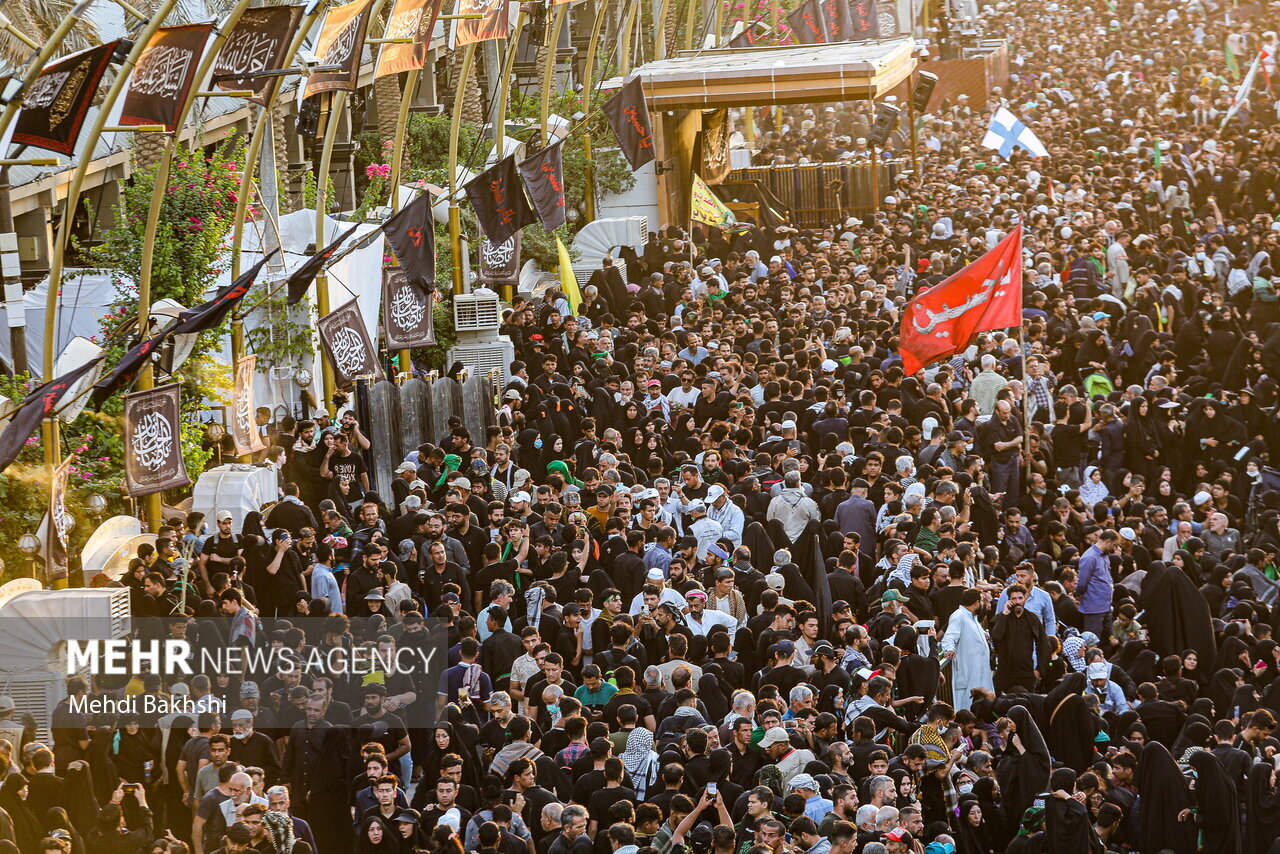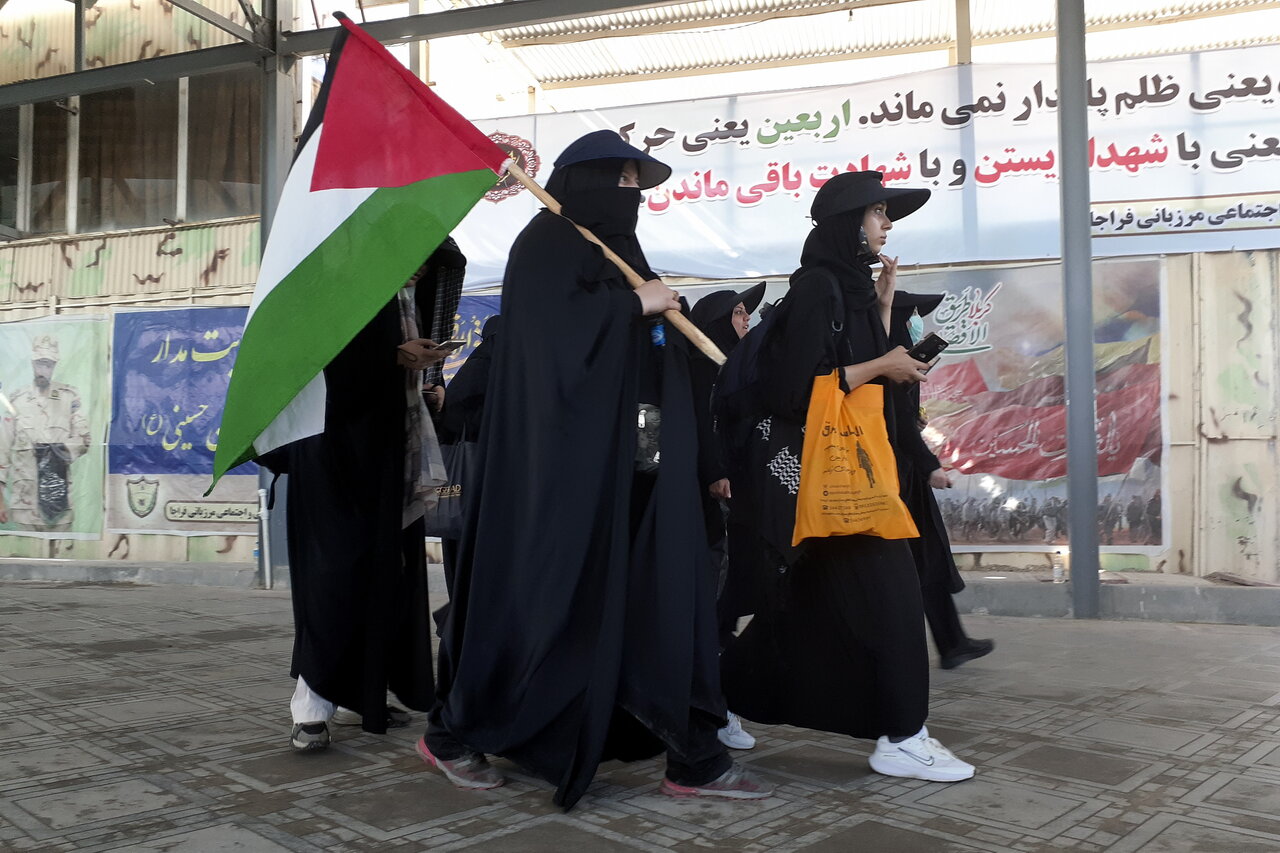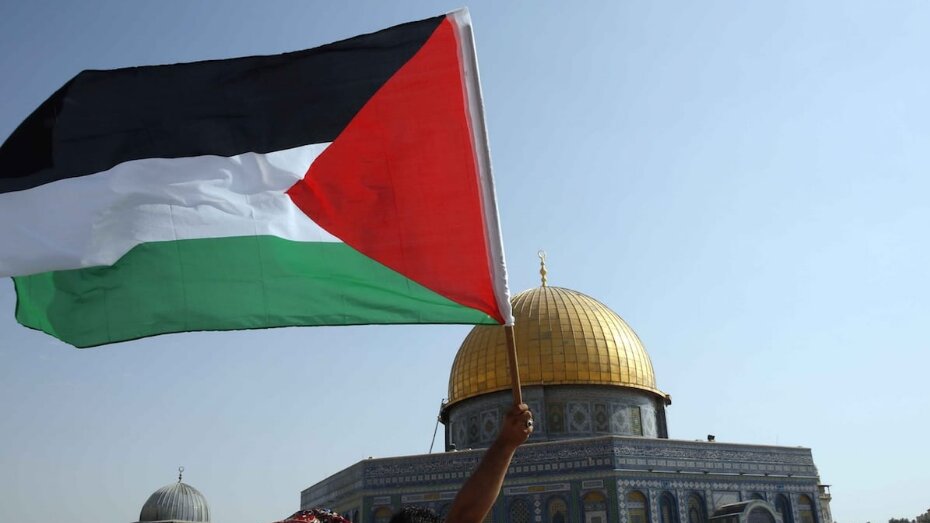Arbaeen commemorates the 40th day after the martyrdom of Imam Hussein (PBUH) and his companions at the Battle of Karbala, representing a powerful symbol of resistance and unity worldwide.
The Arbaeen mourning ceremony is one of the largest religious gatherings in the world, marking the 40th day following Ashura, which is the anniversary of the martyrdom of Imam Hussein (AS).
Arbaeen is observed annually on the 20th of Safar, the second month in the Islamic lunar calendar.
Every year, numerous Shia Muslims make their way to Karbala to pay homage to the holy shrine of Imam Hussein (AS). Pilgrims, especially from Iraq and Iran, embark on long treks to the sacred city, with distances ranging from 80 km to over 500 km, depending on the starting point.
The tradition of visiting Imam Hussein's (AS) shrine on Arbaeen has been a steadfast Shiite observance, maintained even through the periods of the Umayyad and Abbasid dynasties.
The Arbaeen pilgrimage aims not just to visit the shrine of Imam Hussein (AS) while paying a visit (ziyarat) represents a pledge to the Imam's principles and way of life. Pilgrims reaffirm their allegiance to Imam Hussein (AS) during their visit.
Arbaeen in Iran

Arbaeen is observed as a national holiday in Iran. On this day, Shia Muslims mourn and groups engage in public processions of mourning.
In recent years, the significant pilgrimage of Shias striving to reach Karbala for Arbaeen has emerged as one of the most vital mourning observances for Shias worldwide, growing into one of the largest religious gatherings globally.
The majority of international pilgrims participating in this procession are from Iran.
During Arbaeen, Shia Muslims in Iran partake in various rituals, which include gathering on the streets, participating in lengthy processions, chest-beating, preparing food for the needy, and attending Tazieh, a form of street theater with costumes that depict historical events from the Battle of Karbala.
Arbaeen trek

The most significant and largest ziyarat occurs 40 days after the martyrdom anniversary of Imam Hussain (AS) in Iraq, known as the Arbaeen Pilgrimage or Arbaeen trek.
Individuals from diverse backgrounds, including all colors, castes, creeds, ethnicities, and beliefs, participate in the Arbaeen Pilgrimage. This event is not exclusive to people of specific beliefs but offers a blueprint for improved living for all humanity.
Millions from around the world journey to the arid deserts of Iraq, carrying the flags of their nations, and traverse 50 miles from Najaf to Karbala, demonstrating that Imam Hussain is a figure of emulation not just for Muslims or the Shia community, but for all.
Individuals of all ages and health conditions participate in the Arbaeen march, driven solely by their love and reverence for Imam Hussein (AS).
Participants from various countries in the Arbaeen pilgrimage also set up Mawkibs, which are voluntary stations to offer a variety of services to the pilgrims.
Some Mawkibs offer the pilgrims places to rest, while several others provide them with food or medical services at no cost.
The majority of Arbaeen pilgrimage's Mawkibs are hosted by Iraqis and Iranians but this even goes beyond religious and national boundaries and people of other religions and nations also help to hold the Arbaeen march as glorious as possible.
Imam Hussain (AS) character

Imam Hussain (AS) stands as a hero and an enduring historical figure. Unlike other historical personalities who may be forgotten, the struggle of Imam Hussain (AS) remains eternally memorable. His actions and the events surrounding his martyrdom profoundly influence society, as well as individual behavior and cultural practices.
The bravery demonstrated during his life offers numerous lessons that are as applicable today as they were in the past. These teachings are directed not only at Muslims but at all humanity, suggesting that if we were to emulate his conduct, society could achieve peace and happiness.
Among Shias, one way to honor the memory of Imam Hussain (AS) and show respect is by undertaking a pilgrimage (ziyarat) to his sacred shrine in Karbala, Iraq.
Iran prepares to serve Arbaeen pilgrims

Arbaeen pilgrims from Iran, Pakistan, and Azerbaijan utilize six border crossings — Khosravi, Mehran, Chazzabeh, Shalamcheh, Tamarchin, and Bashmaq — located in the west, northwest, and southwest of Iran to enter Iraq and visit the sacred shrine of Imam Hussein (AS) in Karbala.
This year's Arbaeen procession will be supported by 3,500 Iranian Mawkibs, ready to serve the anticipated five million pilgrims, as reported by an official from Iran's Arbaeen Headquarters.
Reza Fallah, the Director General of Kerman province's Red Crescent Society, has confirmed that a team of "80 doctors and nurses" is available to provide medical services for Arbaeen pilgrims from August 15 to September 15.
Brigadier General Iraj Kakavand, the Head of Iran's Anti-Narcotics Police, has expressed satisfaction with the force's robust and commanding presence at border terminals, which helps facilitate the movement of pilgrims and enhances service during the procession.
Furthermore, Mohammad Saberi, the head of Kerman's emergency services, has declared the dispatch of 15 ambulances, three bus ambulances, one motor ambulance, and 45 emergency personnel to the Mehran and Khosravi border crossings to provide support for the pilgrimage.
***2024 Arbaeen Pilgrimage

The 80-kilometer route from the sacred southern Iraqi cities of Najaf to Karbala, traversed on foot by pilgrims, is adorned with Palestinian symbols as a potent protest against Israeli war crimes against humanity in the besieged Gaza Strip.
At the journey's commencement, the al-Aqsa center was established to symbolize the al-Aqsa Mosque in the Israeli-occupied al-Quds.
This year, numerous Palestinians are contributing to the organization of events, showcasing a robust display of Shia-Sunni unity. This comes amidst criticisms aimed at the US and Israel for allegedly establishing an online cyber army to sow discord between the two principal Islamic sects.
***Gaza, Karabala stand on the right side of history

One of the lessons of Karbala is that Imam Hussein( AS), along with his 72 companions, refused to yield to a despotic ruler who sent tens of thousands of soldiers to slay the Imam.
Furthermore, Imam Hussein (AS) was besieged for several days, and barred from obtaining water for his thirsty family, children, and companions.
Today, the Palestinians in Gaza are also under total siege by Tel Aviv. Palestinian children are also thirsty, yet Gaza refuses to wave the white flag to surrender.
In the battle of Karbala, Imam Hussein (AS) chose to die in dignity rather than surrender in humiliation to a tyrant.
The Palestinians are also refusing to surrender to a criminal regime.
***2024 Arbaeen pilgrims eye on Palestine's freedom

Numerous advocates for freedom and justice attending Arbaeen this year are keeping the Palestinian quest for liberty in mind.
The harrowing yet unyielding images from Gaza have motivated Arbaeen pilgrims to hoist the Palestinian flag at the world's largest yearly gathering.
This global gathering offers a significant opportunity to amplify the voice of the oppressed Palestinian people on an international level.
The Israeli regime and its propaganda apparatus, as well as antagonistic media platforms, are actively working to undermine this grand epic through various methods and means.
The Head of the Islamic Development Organization (IDO), Hojjatoleslam Mohammad Qomi, called Arbaeen this year "renunciation from Yazid of the world"
The IDO chief referred to the Israeli killing of more than 40,000 innocent people mainly children and women in the occupied territories and also more than 10,000 Palestinian people buried and missed under the rubbles, describing this year’s of Arbaeen as the manifestation of expressing hatred and animosity against the criminal Zionist regime.
Reported by Amin Mohammadzadegan Khoyi

























Your Comment